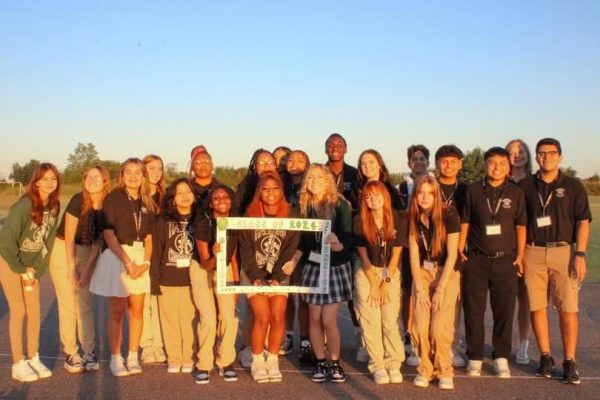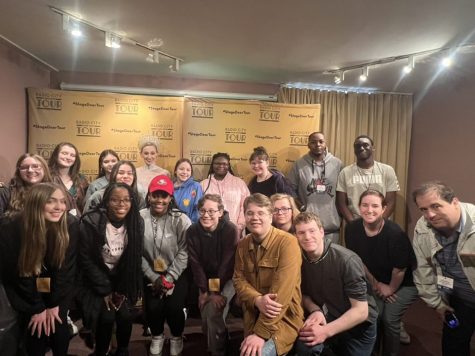Depression: a discussion
May 11, 2015
Depression, while it has come to the forefronts of conversations within the last couple years or so, is still something most people don’t talk about and very few understand. In that way it’s a lot like many other mental illnesses. People talk about them and at the surface they understand, but very few people truly understand depression as a mental illness.
Depression is just that: a mental condition that affects one’s mindset and thus their state of being. Medline Plus defines depression two ways. The first is “feeling sad, blue, unhappy, miserable, or down in the dumps.” This is what most people think of when they think of depression but clinical depression is a different story. Medline defines clinical depression as “a mood disorder in which feelings of sadness, loss, anger, or frustration interfere with everyday life for a longer period of time.”
This kind of depression isn’t really discussed and often people aren’t able to understand its significance. Clinical depression affects every aspect of a person’s everyday life. The tough thing is that because clinical depression is so far reaching and chronic, people often learn to hide it or lie with it so that those around them don’t even notice the problem.
Below are some excerpts from conversations on a selection of topics related to depression. These are real conversations with HCP students (names have been changed to protect privacy) that aim to give insight into what it’s like to have depression and just how normal it can all seem on the surface.
What is depression? What does it look like? What does it feel like?
Student 1: “My major depression disorder just made me feel like I didn’t have energy to do anything. I stopped doing all my clubs, I stopped sports, I still haven’t gotten back into them, I stopped hanging out with friends, I stopped going places, I stopped driving. Just like you didn’t have any energy like it wasn’t, I did cry a lot but it wasn’t even like sadness, it was just I just couldn’t do anything but just sit there.”
Student 2: “To be honest I kind of realized the depression is on and off. Really for my depression it wasn’t like being lethargic or being really sad, well technically it was kind of being really sad but it was basically to the point of crying but I couldn’t.”
Student 3: “Depression to me is something that is ongoing. It’s not just like sadness. It’s a long, recurring thing. I don’t actually think I have depression but I’ve felt it a lot especially with my both of my grandmothers dying and just recently my mom has been so stressed out because she’s trying to keep up with my grandpa who is completely broken hearted from my grandmother. I’ve just been through so much. Depression is just… it’s just a long thing that you have to endure which is really sad you know.”
Student 1: “But I also have a friend who also has depression. He actually has some pretty severe depression but there’s one thing I slightly envy from him which is well the ability to cry whenever like really sad because I reached points where I wanted to cry but I just couldn’t and that’s a horrible feeling because it’s kind of like as if you need to release energy but you just can’t so it just collapses in.”
Student 2: “I think that’s what depression does to a lot of people. Like you’re just not allowed to, like it wasn’t as hard for me but not being able to go out like people would just say “go out you’ll feel better” and I know I’m going to feel better but I cant. Like I’m sitting on the ground like I cannot get up.”
What’s the worst part about depression?
Student 2: “There’s this competition, like not so much in depression, but like with self-harm and even anxiety in the community there’s this competition with like if you’re a like real self-harmer or if you have like real anxiety and stuff…”
Student 4: “Yeah it’s a style, it’s a trend right now and it’s ridiculous. I don’t understand why they’re romanticizing people who actually have problems and it makes it really hard.”
Student 2: “And especially if you’re a pre-teen and you’re getting into it like we were because like for the “real cutting community” and stuff you have to have like serious scars. (shows scars) And I’ve gotten a couple steroid shots now so they’re a lot smaller and they don’t pop up as much as they used to but like that’s why I’m considered a real cutter. Because I have those but people don’t understand how deep you have to cut to get those. It’s past the fat. Like I could stick my finger in it and I could touch my muscle and it’s just… and it’s really upsetting because most cutters don’t cut that deep. Like I didn’t, like all my cutting was really really shallow until I did that. Like and it’s just… that’s the hardest thing.”
Student 3: “My mom just doesn’t care, she just sometimes she takes her anger out on me. A lot of people think ‘oh she’s just crying out for attention,’ like no I’m not. I have some friends that I tell my situation to but I don’t have a lot of people I trust anymore just because of the simple fact that it can get out and then words can get twisted and then I’m looked at as something I’m not.”
The best?
Student 1: “I guess depression also caused me to think a lot more.”
Student 2: “Yes.”
Student 1: “I kind of loved my ADHD and depression. There’s bad things but there’s also good things, I can have more viewpoints and I’m able to notice things more. So I kind of have a slightly positive outlook on it when I’m not suicidal.”
Student 2: “Yeah and it’s like that’s what I’ve noticed too. Like I’m a very negative person even though I’m happy. Like I just assume the worst is going to happen but there’s always a silver lining and I’m really, really, really good at figuring out silver linings. And like it’s a really weird combination because on the one hand it’s like “everything sucks” but there are good things in everything. It’s a really weird combo.”
Medication and therapy:
Student 1: “I was taking medication for a while but then it had some really bad effects. Well not really bad but it took depression which was kind of like hopelessness for me and just cut it out but the circuits leading to it still were there so it was kind of leading to this void like feeling.”
Student 4: “The thing that was always hard for me is I don’t get any support for it in my house because if I ever express any being upset, my anxiety that started during when I reached high school, or my depression which started freshman year it’s always been ‘no you’re just sad right now,’ ‘no you don’t have anxiety you’re just really worried about things’. ‘Therapy doesn’t work, medicine is not good for you’ you know? So I was never given the opportunity to I guess get better. My best friend was pretty much my support for everything and it was sometimes hard when I felt like I couldn’t go to anyone else. I love her, I love being able to go to her but sometimes I need professionals and it was always really hard it just felt like I was kind of stuck in a place that I couldn’t go to.”
Student 1: “With the therapy thing I couldn’t really ever talk to him about my depression or like certain things about me because I didn’t really trust them. I was kind of scared. It’s just a person like ‘hello you’re going to talk to this person now, you don’t know them. Trust them.”
Religion:
Student 1: “It was just like well if there is such a thing as god and he’s apparently kind and such then why is this happening? I kind of gave up on it.”
Student 2: “I’m completely with you on that. I’m extremely anti-religious and I don’t really talk about it too much at school but I have an expressed hatred for the Christian religion.”
Student 4: “I mean mine is mainly because I’ve been raised in a family very polar on the whole religion side. I have my father who’s very religious and my mother who’s very anti-religious and it’s caused problems therefore I just tend to stay away from it all.”
Student 2: “It’s also one of the common, there’s a list that’s like “how to tell if you have depression” and that’s one of them like losing your religion and stuff.”
School Counselors:
Student 4: “You also feel like you can’t go to the school counselors because…”
Student 2: “Oh god, no. Never. Never.”
Student 4: “You tell them anything, they go straight to your parents. I tried that once and it blew up in my face. It made it harder for me at home because when my mom found out she was like ‘why are you being so over dramatic telling people things like that?’ and I think that’s hard. It’s hard to find people to go to if you don’t feel like you can tell them anything without them going straight to your parents.”
Student 3: “The counselor has [really helped]. I did cut myself during my sophomore year and they helped me and they helped me tell my mom and I’ve stopped since. My mom doesn’t really help me she’s more like “get over it, you’ll be okay” but they have really helped me a lot. I would say not completely trust them because you can’t completely trust someone. But just don’t think of them as they’re going to go tell someone because most of the time they won’t, like [the counselor] hasn’t told anyone about my situation or what happened sophomore year. They’ve kept that pretty to themselves. They don’t judge. They’re very open minded and very understanding so I think they should go to the counselors more often.
Can you tell when someone has depression?
Student 4: “A lot of people they wouldn’t expect it from me. I’m not always I don’t know I try to be the happiest person I can be when I’m around other people but it was always hard when I would go home because I work many jobs and so I would work work work, go home and do homework and then not sleep and it was just always getting really rough at nights.”
If you or someone you know is thinking about ending their life please call 1-800-273-TALK (8255).









